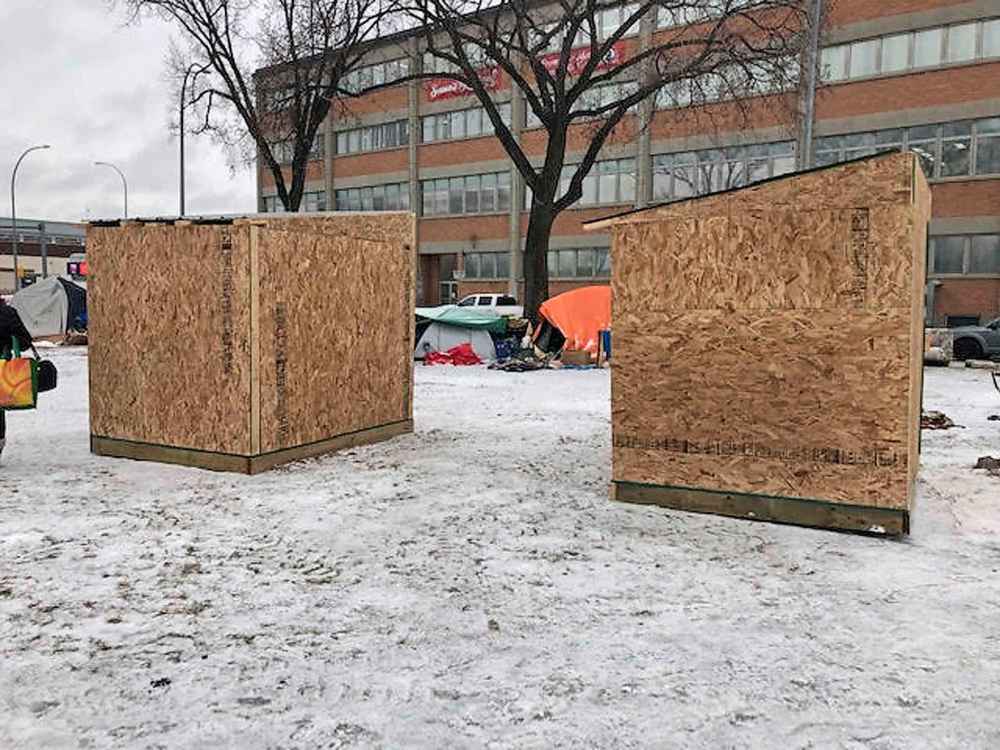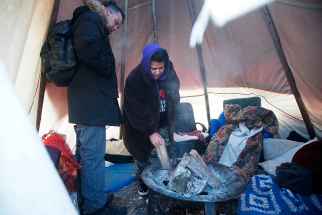Homeless trade warming huts for teepee
Read this article for free:
or
Already have an account? Log in here »
To continue reading, please subscribe:
Monthly Digital Subscription
$0 for the first 4 weeks*
- Enjoy unlimited reading on winnipegfreepress.com
- Read the E-Edition, our digital replica newspaper
- Access News Break, our award-winning app
- Play interactive puzzles
*No charge for 4 weeks then price increases to the regular rate of $19.00 plus GST every four weeks. Offer available to new and qualified returning subscribers only. Cancel any time.
Monthly Digital Subscription
$4.75/week*
- Enjoy unlimited reading on winnipegfreepress.com
- Read the E-Edition, our digital replica newspaper
- Access News Break, our award-winning app
- Play interactive puzzles
*Billed as $19 plus GST every four weeks. Cancel any time.
To continue reading, please subscribe:
Add Free Press access to your Brandon Sun subscription for only an additional
$1 for the first 4 weeks*
*Your next subscription payment will increase by $1.00 and you will be charged $16.99 plus GST for four weeks. After four weeks, your payment will increase to $23.99 plus GST every four weeks.
Read unlimited articles for free today:
or
Already have an account? Log in here »
Hey there, time traveller!
This article was published 17/12/2019 (2183 days ago), so information in it may no longer be current.
Jenna Wirch places a log gently onto the smouldering embers of a small fire pit and renewed flames send smoke through the opening of the teepee at Austin Street and Henry Avenue.
After checking in with a person escaping the cold within the balmy shelter Tuesday morning, Wirch pulls back the canvas panel covering the entrance to step out into the biting north wind.
Wirch is a harm reduction and outreach worker with 13 Moons — an initiative of Aboriginal Youth Opportunities — and on Sunday raised the teepee at the homeless encampment located in a small park across from the Salvation Army and Main Street Project with a group of volunteers.

“The rest of Winnipeg needs to see that we need to take care of everyone, and it’s not just (by) donating to big organizations that get millions of dollars to uphold a colonial system that oppresses Indigenous people on their own lands,” Wirch said.
Less than three weeks ago, two basic wooden warming huts were donated by the Urban Knights and Ladies Veterans Ambassador Peace Patrol to people living in a neighbouring encampment along the Disraeli Freeway.
Within 48 hours of the shelters being delivered to the encampment, the huts were torn down and taken away by members of the Winnipeg Police Service. The huts, according to city officials, were in violation of various city bylaws and regulations.
Wirch watched with outrage as the shelters came down, yet days later warming huts built for the river skating trail appeared on the grounds of the Legislature as part of Manitoba’s 150th anniversary celebration. The contradiction spurred Wirch into action.
“I found it really hypocritical, and I was like ‘who is taking care of us?’ No one is. We’re taking care of ourselves,” Wirch said. “We’re in Treaty 1 territory and we will take care of our own.”
Wirch put out the call for a teepee on social media with the intent to offer people experiencing homelessness another choice for shelter and warmth; one rooted in Indigenous tradition rather than colonial institutions, Wirch said.
The Indigenous Family Centre answered the call and provided the teepee. Wirch hopes it will remain on site for the duration of the winter and has an ongoing call for wood to fuel the fire.
As a harm reduction worker and someone who has been homeless, Wirch said it’s important to meet people where they’re at rather than impose policies and systems that push vulnerable people into the cold.
On Tuesday, Wirch said no one from the City of Winnipeg or any other organization had requested the teepee be removed.

Community interventions at temporary encampments — such as the addition of a teepee or warming huts — require consultation and consent from people at the camp and are assessed to see whether individuals’ human rights are being upheld or violated, a spokesperson for End Homelessness Winnipeg said.
End Homelessness Winnipeg was founded in 2015 and works with with homeless-serving agencies and government to develop long-term, solutions to prevent and end homelessness. The organization, however, does not inspect camps for safety or bylaw enforcement.
That responsibility falls to the City of Winnipeg and police. As part of an interim strategy to address temporary encampments, Main Street Project outreach workers are deployed first to sites identified by the public, through calls to 311 or police, to assess safety concerns.
“If a teepee is located and erected in consultation with and consent from people living in the area; is culturally appropriate; and creates no new environmental risks particularly for the health or safety of people living there, then it is most likely upholding their human rights rather than a violation of them,” the spokesperson said.
“Residents of temporary encampments are rights claimants and their human rights must be upheld through an approach that works to secure adequate housing while enabling individuals to define for themselves what constitutes a home providing dignity and security.”
danielle.dasilva@freepress.mb.ca

Our newsroom depends on a growing audience of readers to power our journalism. If you are not a paid reader, please consider becoming a subscriber.
Our newsroom depends on its audience of readers to power our journalism. Thank you for your support.
History
Updated on Tuesday, December 17, 2019 6:32 PM CST: Updates photo











